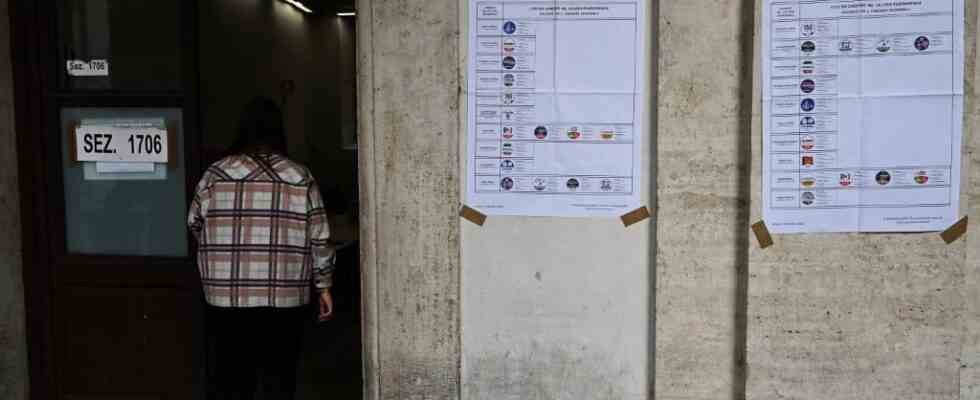The post-fascist Fratelli d’Italia party, led by Giorgia Meloni, won Sunday’s legislative elections in Italy, an unprecedented event since 1945, according to exit polls.
Turnout was down sharply in the legislative elections this Sunday in Italy, where the post-fascist Fratelli d’Italia party, led by Giorgia Meloni, came out on top, an unprecedented fact since 1945, according to exit polls. .
According to the Ministry of the Interior, turnout was 50% at 7:00 p.m., down eight points from the 2018 legislative elections.
The decline is particularly marked in the southern regions of the peninsula (-12 points), which had massively contributed to the victory four years ago of the 5 Star Movement, an anti-system formation yet credited with having established in 2019 a ” minimum citizen income” for the poorest.
Chamber of Deputies and Senate
By remaining in opposition to all the successive governments since the 2018 legislative elections, Fratelli d’Italia (FdI) has established itself as the main alternative and has gone from 4.3% four years ago to around a quarter of the vote (between 22 and 26%), according to the first exit polls, thus becoming the leading party in the country.
The coalition it forms with the other far-right party, the League of Matteo Salvini, and Forza Italia, the conservative party of Silvio Berlusconi, would win up to 47% of the vote and with the complex game of constituencies, should ensure an absolute majority of seats in both the Chamber of Deputies and the Senate.
If these results are confirmed, FdI and the League would together win “the highest percentage of votes ever recorded by far-right parties in the history of Western Europe from 1945 to today”, noted the Center Italian for Electoral Studies (CISE).
The formation founded at the end of 2012 by Giorgia Meloni with dissidents from Berlusconism is ahead of Enrico Letta’s Democratic Party (PD), which failed to raise a useful vote to block the far right and only won between 17 and 21%.
“Write History”
Fratelli d’Italia owes its success as much to the broken promises of its adversaries and the wind of “clearance” blowing on the peninsula as to the charisma of its leader.
This 45-year-old Roman who, as a young activist, said she admired Mussolini, managed to demonize his image and unite in his name the fears and anger of millions of Italians in the face of soaring prices, unemployment, threats of recession or neglect of public services.
“Today you can help make history,” she tweeted to her followers on Sunday.
Whatever the Italian government resulting from the elections, which will not take office until the end of October at the earliest, its path already appears to be strewn with pitfalls and without much room for manoeuvre. In particular, he will have to manage the crisis caused by galloping inflation, while Italy is already crumbling under a debt representing 150% of GDP, the highest ratio in the euro zone behind Greece.
In this country with chronic governmental instability, experts already agree on the short life expectancy of the victorious coalition, a marriage of convenience between three allies with competing ambitions.
Giorgia Meloni, with no government experience apart from a short-lived stint at the youth ministry (2008-2011), will have a lot to do managing her cumbersome, much more experienced allies: Silvio Berlusconi has been head of government several times and Matteo Salvini, minister of the Interior and Deputy Prime Minister.
In the Ukrainian file, Europe and the allies of Italy, a member of NATO, will also scrutinize the distribution of portfolios between the three parties. Because if Giorgia Meloni is an Atlanticist and supports the sanctions against Moscow, Mr. Salvini opposes them.

